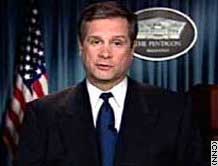| MCINTYRE: Well, the interesting
thing, Wolf, is that it's not unexpected that Iraq would accept the U.N.
resolution at this point.
And in fact, Defense Secretary (Donald)
Rumsfeld has laid out a series of things that Iraq could do in the coming
weeks and months that could essentially complicate things for the United
States, and the ironic part about it is the more cooperative Iraq is, or
appears to be, the more complicated the problem becomes for the Pentagon.
The worst-case scenario, in terms of the
U.S. attempting to disarm Iraq, would be a scenario under which Iraq allowed
the inspectors in, they actually found some weapons of mass destruction,
and then Iraq would simply declare that whatever the inspectors have found
to be the totality of its weapons of mass destruction program. That would
lead the United States .... [to ask] can it accept yes for an answer?
The problem is the U.S. is convinced that
Iraq does have weapons of mass destruction and has hidden many of them,
some of them in underground locations that would be extremely hard for
inspectors to find.
[It is easier if] Iraq defies the inspectors
or makes their job complicated. Then the course of action for the United
States -- military action -- is fairly clear. But if this plays out where
Iraq is able to appear to be cooperative every step of the way, and even
admits that there are some weapon systems or elements of weapon systems
that are found, that vastly complicates things.
Now, Defense Secretary Donald Rumsfeld
raised this very question in remarks on Monday night to a group here in
Washington, and asked himself the question: "What do we do if we get to
that point where Iraq appears to have been compliant, while we know it
has weapons of mass destruction?" And he simply said, "It's too soon to
say what the U.S. would do in that situation."
So, Wolf, the ironic thing about it is
the complicated situation for the United States and the military -- in
terms of planning -- ... if Iraq continues to say yes.

|
